冀教版六年级英语下册名词复习资料
冀教版六年级英语下册复习资料
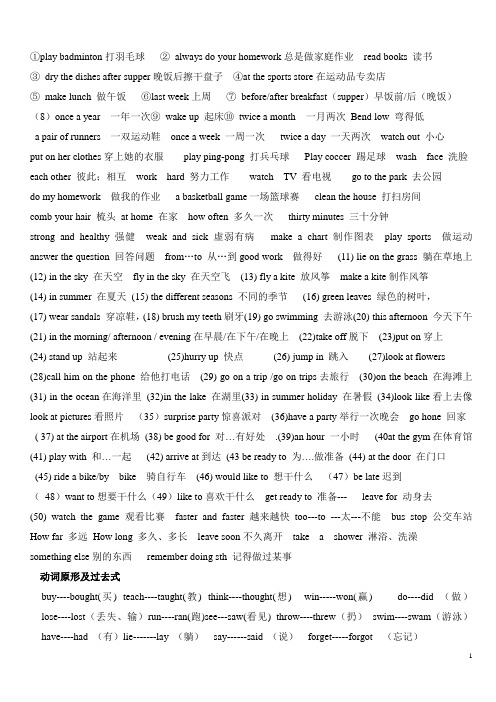
①play badminton打羽毛球②always do your homework总是做家庭作业read books 读书③dry the dishes after supper晚饭后擦干盘子④at the sports store在运动品专卖店⑤make lunch 做午饭⑥last week上周⑦before/after breakfast(supper)早饭前/后(晚饭)(8)once a year 一年一次⑨wake up 起床⑩twice a month 一月两次Bend low 弯得低a pair of runners 一双运动鞋once a week 一周一次twice a day 一天两次watch out 小心put on her clothes穿上她的衣服play ping-pong 打兵乓球Play coccer 踢足球wash face 洗脸each other 彼此;相互work hard 努力工作watch TV 看电视go to the park 去公园do my homework 做我的作业 a basketball game一场篮球赛clean the house 打扫房间comb your hair 梳头at home 在家how often 多久一次thirty minutes 三十分钟strong and healthy 强健weak and sick 虚弱有病make a chart制作图表play sports 做运动answer the question 回答问题from…to 从…到good work 做得好(11) lie on the grass 躺在草地上(12) in the sky 在天空fly in the sky 在天空飞(13) fly a kite 放风筝make a kite制作风筝(14) in summer 在夏天(15) the different seasons 不同的季节(16) green leaves 绿色的树叶,(17) wear sandals 穿凉鞋,(18) brush my teeth刷牙(19) go swimming 去游泳(20) this afternoon 今天下午(21) in the morning/ afternoon / evening在早晨/在下午/在晚上(22)take off脱下(23)put on穿上(24) stand up 站起来(25)hurry up 快点(26) jump in 跳入(27)look at flowers (28)call him on the phone 给他打电话(29) go on a trip /go on trips去旅行(30)on the beach 在海滩上(31) in the ocean在海洋里(32)in the lake 在湖里(33) in summer holiday 在暑假(34)look like看上去像look at pictures看照片(35)surprise party惊喜派对(36)have a party举行一次晚会go hone 回家( 37) at the airport在机场(38) be good for 对…有好处.(39)an hour 一小时(40at the gym在体育馆(41) play with 和…一起(42) arrive at到达(43 be ready to 为….做准备(44) at the door 在门口(45) ride a bike/by bike 骑自行车(46) would like to 想干什么(47)be late迟到(48)want to想要干什么(49)like to喜欢干什么get ready to 准备--- leave for 动身去(50) watch the game 观看比赛faster and faster 越来越快too---to ---太---不能bus stop 公交车站How far 多远How long 多久、多长leave soon不久离开take a shower 淋浴、洗澡something else别的东西remember doing sth 记得做过某事动词原形及过去式buy----bought(买) teach----taught(教) think----thought(想) win-----won(赢) do----did (做)lose----lost(丢失、输)run----ran(跑)see---saw(看见) throw----threw(扔)swim----swam(游泳)have----had (有)lie-------lay (躺)say------said (说)forget-----forgot (忘记)begin------bagin (开始)bring-----brought (带来)eat----ate (吃)go-----went(去)is \am-----was are-----were get---got come---came(来) find---found(找) hit---hit(打)put---put make---made(制作)(1) How far is Beijing? ---About nine thousand kilometers. 北京有多远?--大约九千公里。
冀教版六年级英语语法复习要点归纳
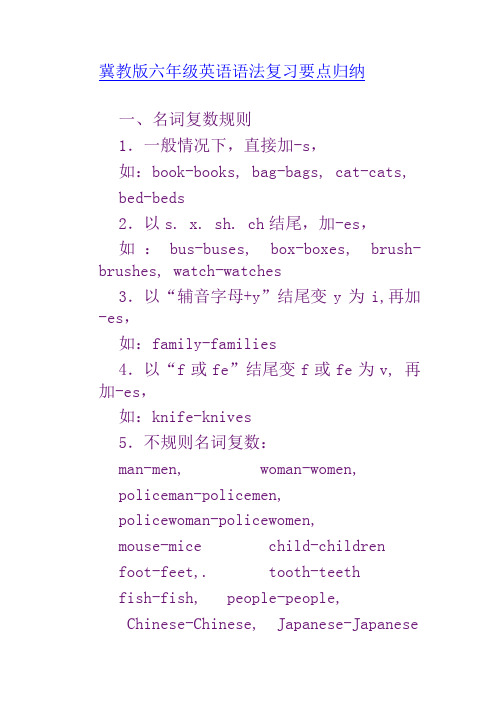
冀教版六年级英语语法复习要点归纳一、名词复数规则1.一般情况下,直接加-s,如:book-books, bag-bags, cat-cats,bed-beds2.以s. x. sh. ch结尾,加-es,如:bus-buses, box-boxes, brush-brushes, watch-watches3.以“辅音字母+y”结尾变y为i,再加-es,如:family-families4.以“f或fe”结尾变f或fe为v, 再加-es,如:knife-knives5.不规则名词复数:man-men, woman-women,policeman-policemen,policewoman-policewomen,mouse-mice child-childrenfoot-feet,. tooth-teethfish-fish, people-people,Chinese-Chinese, Japanese-Japanese二、一般现在时1.一般现在时表示经常或习惯性的动作,也可表示现在的状态或主语具备的性格和能力。
2.一般现在时中,没有be动词和情态动词,主语为第三人称单数的肯定句,动词要按规则加上s,主语是非第三人称单数的肯定句,动词用原形。
3.在一般现在时中,句中有be动词或情态动词时,否定句在be动词和情态动词后加not,一般疑问句将be动词或情态动词放在句首。
4.在一般现在时中,句中没有be动词或情态动词时,主语为第三人称单数的否定句在动词前加does+not (doesn’t),一般疑问句在句首加does,句子中原有动词用原形;主语为非第三人称单数,否定句用do+not (don’t),一般疑问句在句首加do,句子中动词用原形。
动词+s的变化规则1.一般情况下,直接加-s,如:cook-cooks, milk-milks2 .以s. x. sh. ch. o结尾,加-es,如:guess-guesses, wash-washes, watch-watches, go-goes3.以“辅音字母+y”结尾,变y为i, 再加-es,如:study-studies三、现在进行时1.现在进行时表示现在正在进行或发生的动作,也可表示当前一段时间内的活动或现阶段正在进行的动作。
冀教版小学英语六年级下册各单元知识点汇总
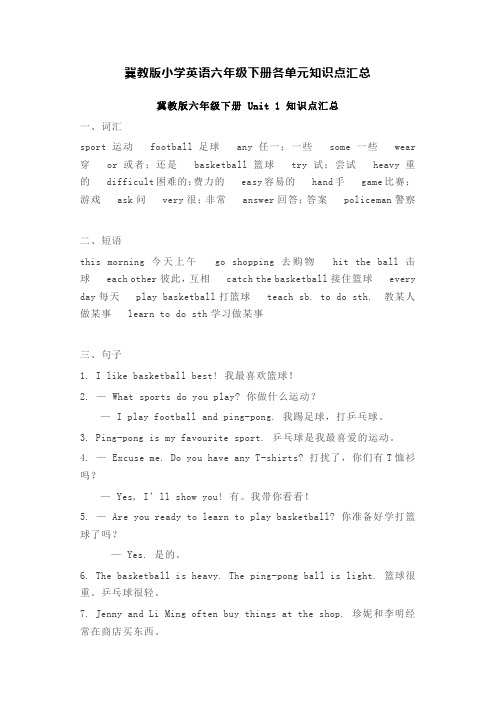
冀教版小学英语六年级下册各单元知识点汇总冀教版六年级下册 Unit 1 知识点汇总一、词汇sport运动football足球any任一;一些some一些wear 穿or或者;还是basketball篮球try试;尝试heavy重的difficult困难的;费力的easy容易的hand手game比赛;游戏ask问very很;非常answer回答;答案policeman警察二、短语this morning今天上午go shopping去购物hit the ball击球each other彼此,互相catch the basketball接住篮球every day每天play basketball打篮球teach sb. to do sth. 教某人做某事learn to do sth学习做某事三、句子1. I like basketball best! 我最喜欢篮球!2. — What sports do you play? 你做什么运动?— I play football and ping-pong. 我踢足球,打乒乓球。
3. Ping-pong is my favourite sport. 乒乓球是我最喜爱的运动。
4. — Excuse me. Do you have any T-shirts? 打扰了,你们有T恤衫吗?— Yes, I’ll show you! 有。
我带你看看!5. — Are you ready to learn to play basketball? 你准备好学打篮球了吗?— Yes. 是的。
6. The basketball is heavy. The ping-pong ball is light. 篮球很重。
乒乓球很轻。
7. Jenny and Li Ming often buy things at the shop. 珍妮和李明经常在商店买东西。
This morning, Jenny and Li Ming bought things at the shop. 今天早晨,珍妮和李明在商店买了东西。
冀教版六年级英语总复习总结重点单词
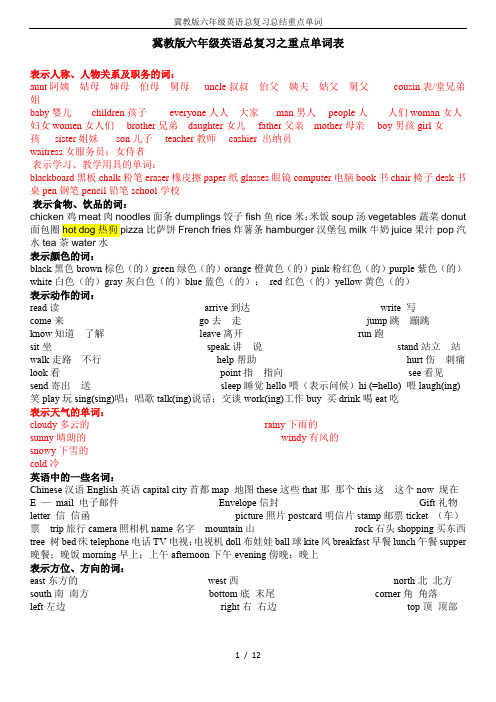
冀教版六年级英语总复习之重点单词表表示人称、人物关系及职务的词:aunt阿姨姑母婶母伯母舅母uncle叔叔伯父姨夫姑父舅父cousin表/堂兄弟姐baby婴儿children孩子everyone人人大家man男人people人人们woman女人妇女women女人们brother兄弟daughter女儿father父亲mother母亲boy男孩girl女孩sister姐妹son儿子teacher教师cashier 出纳员waitress女服务员;女侍者表示学习、教学用具的单词:blackboard黑板chalk粉笔eraser橡皮擦paper纸glasses眼镜computer电脑book书chair椅子desk书桌pen钢笔pencil铅笔school学校表示食物、饮品的词:chicken鸡meat肉noodles面条dumplings饺子fish鱼rice米;米饭soup汤vegetables蔬菜donut 面包圈hot dog热狗pizza比萨饼French fries炸薯条hamburger汉堡包milk牛奶juice果汁pop汽水tea茶water水表示颜色的词:black黑色brown棕色(的)green绿色(的)orange橙黄色(的)pink粉红色(的)purple紫色(的)white白色(的)gray灰白色(的)blue蓝色(的);red红色(的)yellow黄色(的)表示动作的词:read读arrive到达write 写come来go去走jump跳蹦跳know知道了解leave离开run跑sit坐speak讲说stand站立站walk走路不行help帮助hurt伤刺痛look看point指指向see看见send寄出送sleep睡觉hello喂(表示问候)hi (=hello) 喂laugh(ing)笑play玩sing(sing)唱;唱歌talk(ing)说话;交谈work(ing)工作buy 买drink喝eat吃表示天气的单词:cloudy多云的rainy下雨的sunny晴朗的windy有风的snowy下雪的cold冷英语中的一些名词:Chinese汉语English英语capital city首都map 地图these这些that那那个this这这个now 现在E —mail 电子邮件Envelope信封Gift礼物letter 信信函picture照片postcard明信片stamp邮票ticket (车)票trip旅行camera照相机name名字mountain山rock石头shopping买东西tree 树bed床telephone电话TV电视;电视机doll布娃娃ball球kite风breakfast早餐lunch午餐supper 晚餐;晚饭morning早上;上午afternoon下午evening傍晚;晚上表示方位、方向的词:east东方的west西north北北方south南南方bottom底末尾corner角角落left左边right右右边top顶顶部from…to从……到……in在……内on在……上面under在……下面behind在……后in front of 在……前面inside(在)里面outsider(在)外面near在above在……上方below在……下方beside 在……旁边表示人体器官的词:arm胳臂body身体ear耳朵elbow肘eye眼finger手指foot脚(复数为feet)hand手head头knee膝盖leg腿mouth嘴nose鼻子shoulder肩膀stomach胃;肚子toe脚趾(复数为toes)某些形容词:quiet安静的悄悄的quick快速的飞快的loud吵闹声音响亮的hard难困难的easy容易的slower更(较)慢的slow慢的缓慢的faster更(较)快的fast快快速的old老的young年轻的sick有病的short 短的;矮的tall高的far远的;遥远的big大的new新的old旧的;老的small小的表示地点、场所和道路的词:avenue大街road路street街街道hotel饭店旅馆house房子restaurant餐馆gym体育馆;健身房library图书馆shop商店clerk办事员apartment公寓套间用于连接性的词:and和many许多some一些but但是about大约表示衣服种类的词:jeans牛仔裤clothes衣服jacket短上衣;夹克(衫)coat外套;大衣blouse女衬衫dress 连衣群hat帽子pants裤子shirt(男式)衬衫shoes鞋skirt裙子socks短袜sweater毛衣表示人称的代词:he他her她的his他的my我的our我们的she她they他们她们their他(她)们的we我们your你们的你的表示地名、国家名称的词:country国家Australia澳大利亚Canada加拿大China中国U·S美国U·K英国表示数字的词:first第一one一second第二two 二third第三three三fourth第四four四fifth第五five五sixth第六six 六seventh第七seven七eighth第八eight八ninth第九nine九tenth第十ten十eleventh第十一eleven十一twelfth第十二twelve十二thirteen十三fourteen十四fifteen十五sixteen十六seventeen十七eighteen十八nineteen十九twenty二十twenty-one二十一thirty三十forty四十fifty五十sixty六十seventy七十eighty八十ninety九十hundred百表示交通工具的词:bus公共汽车bicycle自行车cab出租汽车car小汽车truck卡车airplane飞机train火车表示人的感觉的词:cry(ing)哭happy高兴的hot热sad悲伤的hungry饥饿的thirsty渴的某些副词:loudly吵闹地quickly快速地quietly安静地slowly缓慢地表示动物的单词:elephant大象goat山羊kangaroo袋鼠lion狮子monkey猴子pig猪sheep羊;绵羊tiger老虎cat猫cow 牛dog狗duck鸭wolf狼表示月份的词:January一月February二月March三月April四月May五月June六月July七月August八月September九月October十月November十一月December十二月表示星期的词:Sunday星期天Monday星期一Tuesday星期二Wednesday星期三Thursday星期四Friday星期五Saturday星期六表示水果的词:apple苹果banana香蕉melon瓜fruit水果grapes葡萄strawberry草莓(复数为strawberries)第一章字母英语是拼音文字,字母是英语的最小书写单位。
冀教版六年级英语下册知识点汇总
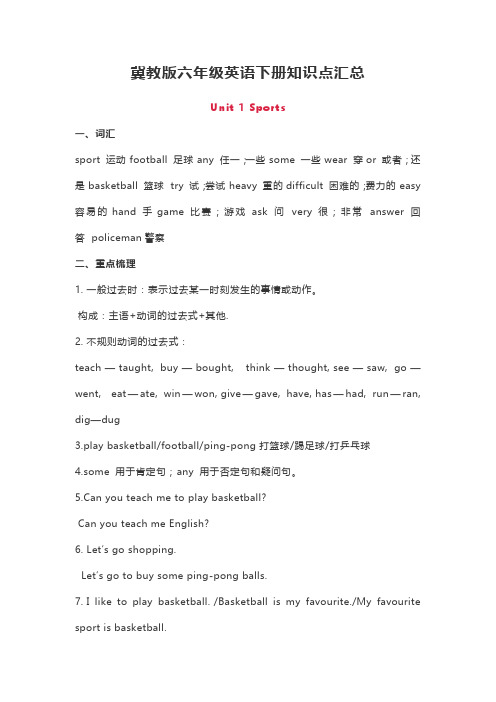
冀教版六年级英语下册知识点汇总Unit 1 Sports一、词汇sport 运动 football 足球 any 任一;一些 some 一些 wear 穿or 或者;还是 basketball 篮球 try 试;尝试 heavy 重的difficult 困难的;费力的 easy 容易的 hand手 game比赛;游戏ask 问 very很;非常 answer 回答 policeman警察二、重点梳理1. 一般过去时:表示过去某一时刻发生的事情或动作。
构成:主语+动词的过去式+其他.2. 不规则动词的过去式:teach—taught, buy—bought, think—thought, see—saw, go—went, eat—ate, win—won, give—gave, have, has—had, run—ran, dig—dug3.play basketball/football/ping-pong 打篮球/踢足球/打乒乓球4.some 用于肯定句;any 用于否定句和疑问句。
5.Can you teach me to play basketball?Can you teach me English?6. Let’s go shopping.Let’s go to buy some ping-pong balls.7. I like to play basketball. /Basketball is my favourite./My favourite sport is basketball.8. A: Do you have any ping-pong balls?B: Yes, I have some./No, I don’t have any.9. A: Do you like these or those?B: I like these./ I like those. (选择疑问句,答案在问句中选择)10.Do you want to play basketball?Are you ready to learn to play basketball?Are you playing basketball?11. Let me try. /Let me try again.12. (too)heavy—light, (too)easy—difficult, throw—catch, teach—learn13. hit—hitting14.I taught Jenny to hit the ball.15.Danny wanted to hit the ball,too.16.I taught Li Ming to throw and catch the ball.17.Did Danny learn to play basketball, too?18.He played basketball with a ping-pong ball.19. teach each other互相教We teach each other a sport.We teach each other to play basketball.20.We watched Bob play basketball.I help my mother make supper.watch, help后面加不带to的动词不定式。
冀教版六年级英语下册复习资料

冀教版六年级英语下册复习资料UNIT Sports一、核心词汇sport运动, football足球, any任一;一些, some一些, wear穿, or或者;还是, basketball篮球, try试;尝试, heavy重的, difficult困难的;费力的, easy容易的, hand手, game比赛;游戏, ask问, very很;非常, answer回答;答案, policeman警察二、拓展词汇best最好的(good的最高级), okay行;好(=OK), thought想(think的过去式)三、核心句型1.What sports do you play?你做什么运动?解读:此句为询问某人做什么运动的句型。
举一反三: What sports does Eric play?埃里克做什么运动?2.Do you want these or those?你想要这些还是那些?解读:此句为询问某人选择哪一个的句型(选择疑问句)。
举一反三: Are you against it or for it?你对此事是反对还是赞成?—Would you like some tea or coffee?你想喝点茶还是咖啡?—I’d like some coffee. 我想喝点咖啡。
3.Did you have fun?你们玩得开心吗?解读:此句为询问某人过去是否做了某事的句型。
肯定回答用“Yes, …”,否定回答用“No, …”。
举一反三:—Did Mike go fishing with you yesterday?昨天迈克和你一起去钓鱼了吗?—Yes, he did. 是的,他去了。
—Did they walk to the park?他们步行去的公园吗?—No, they didn’t. 不,他们不是。
4.What did you do this evening?今天晚上你做什么了?解读:此句为询问某人在过去某一时间做了什么事情的句型。
冀教版六年级英语下册复习要点
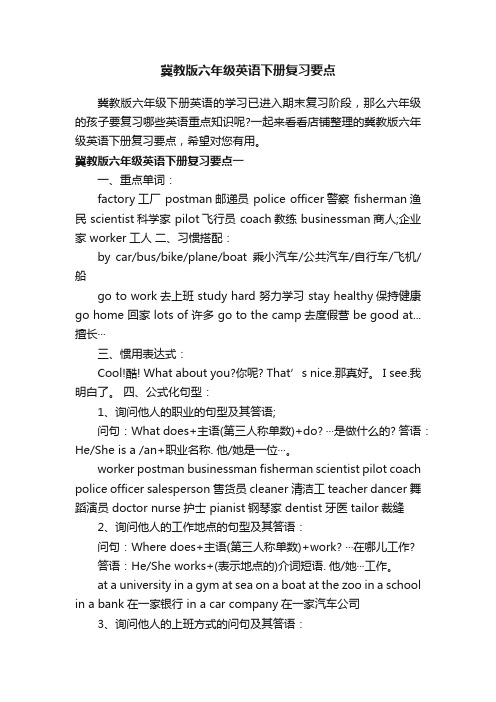
冀教版六年级英语下册复习要点冀教版六年级下册英语的学习已进入期末复习阶段,那么六年级的孩子要复习哪些英语重点知识呢?一起来看看店铺整理的冀教版六年级英语下册复习要点,希望对您有用。
冀教版六年级英语下册复习要点一一、重点单词:factory工厂 postman邮递员 police officer警察 fisherman渔民 scientist科学家 pilot飞行员 coach教练 businessman商人;企业家 worker工人二、习惯搭配:by car/bus/bike/plane/boat乘小汽车/公共汽车/自行车/飞机/船go to work去上班 study hard 努力学习 stay healthy保持健康go home 回家 lots of 许多 go to the camp去度假营 be good at...擅长···三、惯用表达式:Cool!酷! What about you?你呢? That’s nice.那真好。
I see.我明白了。
四、公式化句型:1、询问他人的职业的句型及其答语;问句:What does+主语(第三人称单数)+do? ···是做什么的? 答语:He/She is a /an+职业名称. 他/她是一位···。
worker postman businessman fisherman scientist pilot coach police officer salesperson售货员 cleaner清洁工 teacher dancer舞蹈演员 doctor nurse护士 pianist钢琴家 dentist牙医 tailor裁缝2、询问他人的工作地点的句型及其答语:问句:Where does+主语(第三人称单数)+work? ···在哪儿工作?答语:He/She works+(表示地点的)介词短语. 他/她···工作。
冀教版六年级下册英语知识点
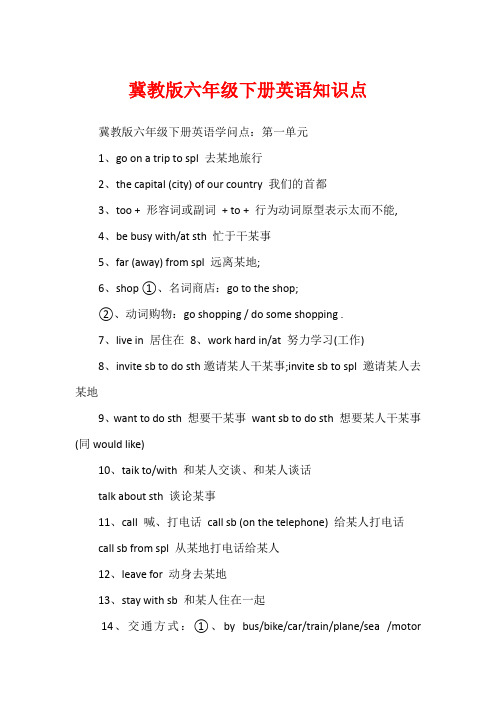
冀教版六年级下册英语知识点冀教版六年级下册英语学问点:第一单元1、go on a trip to spl 去某地旅行2、the capital (city) of our country 我们的首都3、too + 形容词或副词+ to + 行为动词原型表示太而不能,4、be busy with/at sth 忙于干某事5、far (away) from spl 远离某地;6、shop ①、名词商店:go to the shop;②、动词购物:go shopping / do some shopping .7、live in 居住在8、work hard in/at 努力学习(工作)8、invite sb to do sth邀请某人干某事;invite sb to spl 邀请某人去某地9、want to do sth 想要干某事want sb to do sth 想要某人干某事(同would like)10、taik to/with 和某人交谈、和某人谈话talk about sth 谈论某事11、call 喊、打电话call sb (on the telephone) 给某人打电话call sb from spl 从某地打电话给某人12、leave for 动身去某地13、stay with sb 和某人住在一起14、交通方式:①、by bus/bike/car/train/plane/sea /motorbike/boat/taxi②、on a bus/bike/train/plane/smotor bike/boat③、take a bus/bike/car/train/plane/ motor bike/boat/taxi④、其它:in a car/ boat/taxi ; on foot ; ride a bike .15、may I?确定答复:Yes, you may /Yes,please /Yes,of course /Sure .否认答复:No, you may not /no,you can`t /No,you mustn`t .16、plan 名词打算:make a plan for sth 为某事制定打算;动词打算:plan (for) sth为某事做打算;plan to do sth 打算干某事.17、need to do sth :须要去作某事;18、tell sb about/of sth :告知某人关于某事.19、go back to spl 回到某地20、pack A with B :把B打包放进A中Xiao is packing her bag with her books .21、给某人写信:write to sb / write sb a letter / write a letter to sb ;22、a suit of clothes 一套衣服.23、a pair of shoes 一双鞋子; two pairs of glasses 两副眼镜;留意:pair短语在句中假如作主语,应依据pair的单复数确定谓语动词的单复数.24、Have a good trip ! 旅途开心!冀教版六年级下册英语学问点:其次单元1、argue with sb about sth 因某事和某人争辩2、get on 上车get off 下车3、be ready for sth 为某事做打算4、a ticket to Canada去加拿大的票5、in +某种语言用某种语言speak+某种语言说某种语言6、pardon me 对不起、请重复一遍=Excuse me7、have to(客观的必需) =must(主观上的必需) 必需、不得不、必须得8、look out of 从向外看out of sth 某物的外面9、here and there 到处、四处10、point to 指向point at指着point out 指出11、at the top of 在的顶端at the bottom of在的底部12、try to do sth 努力、设法干某事13、be from spl = come from spl 来自某地14、of course / Sure / Ok 当然16、place of interest /the interesting place 名胜古迹17、enjoy doing sth 喜爱干某事18、hope to do sth 盼望干某事hope+宾语从句盼望19、Its time for sth / Its time to do sth / Its time for sb to do sth 该干某事的时候了20、wait for sb/sth 等待某人、某物wait for (sb) to do sth 等待(某人)干某事21、find out 查出、查明fing sb doing sth 发觉某人正在干某事22、feel+形容词/ be +形容词:感觉怎么样23、a bowl of /a bottle of /a glass of /a cup of / a can of pop 一碗/ 一瓶/ 一杯/ 一听汽水24、be quiet 静谧keep quiet 保持静谧25、play a word game 玩一个单词嬉戏play with sb 和某人一起玩play with sth 玩弄某物如:Dont play with fire ! 不要玩火!play +球类名词(不要the) play+the +乐器名词(必需要the)如:play the piano26、watch TV / a football match / a movie see a flim 看电影read the book / the newspaper27、show sb sth=show sth to sb 给某人看某物28、take care of = look after 照看、照料、照看29、look for 找寻冀教版六年级下册英语学问点:第三单元1、Let sb do sth 让某人干某事2、I speak good English = I speak English well .我英语讲得好.3、translate for sb 为某人翻译4、laugh at sth 讪笑某人fly a kite / fly kites 放风筝5、have fun 玩得开心have fun (in) doing sth 干某事玩得很快乐6、make fun 开玩笑7、hurt ones +身体部位:hurt my nose / hurt my arm .8、Dont be afraid . 不要胆怯Dont worry . 不要担忧9、be careful / look out 当心、留神10、worry about sth /sb be worried about sth /sb 担忧某物/ 某人11、put on 把放在上putin 把放进里面put down把放在下面12、take ones picture 给某人照相take a picture /take pictures照相13、用with + 详细工具如:She write a letter to her friends pen .by 通过某种方式She sends messages to her friends postcard14、fall off 从上掉下来15、help sb do sth / help sb with sth协助某人干某事16、at the post office 在邮局17、break his tail 折断了他的尾巴18、at the traffic lights 在交通灯的地方19、There be + sb +动词ing 形式+地点(介词短语) 某处有某人正在干某事20、on the left 在左边on the right 在右边21、on the postcard 在明信片上22、in the top、right corner of sth 在的右上角23、go straight down 沿着直走24、in an hour 一个小时以后25、write sb a letter / write a letter to sb / write to sb给某人写信26、a pair of chopsticks 一双筷子27、send sb sth /send sth to sb给某人寄(送)某物28、buy sb sth / buy sth for sb 给某人买某物29、be late for sth 干某事迟到30、turn left向左转turn right向右转31、begin/start to do sth /begin/start doing sth 起先干某事32、a gift for sb 给某人的礼物33、a kind of 一种all kinds of 各种各样的34、A man who has not climbed the Great Wall is a true man .35、see sb doing sth 望见某人正在干某事(动作正在进展)see sb do sth 望见某人干了某事(动作发生的过程)36、很多many +可数名词much+不行数名词a lot of lots of37、一点、a little +不行数名词一些a few +可数名词some 用于确定句any用于否认句和疑问句38、put on 穿上、戴上(穿的动作) wear 穿着、戴着(穿的状态)39、turn on 翻开9、turn up 调大turn off 关闭turn down 调小40、停顿干某事stop to do sth 停下来去做另外一件事stop doing sth 停顿正在干的事41、在的前面in front of 在(室外)没有局限空间的地方的前面in the front of 在(室内)有限空间的地方的前面猜你感爱好的:1.冀教版小学六年级下册英语总复习资料2.冀教版六年级英语下册复习要点3.冀教版六年级下册英语复习重点句子4.冀教版六年级下册英语复习资料5.冀教版六年级英语重点句子复习资料。
- 1、下载文档前请自行甄别文档内容的完整性,平台不提供额外的编辑、内容补充、找答案等附加服务。
- 2、"仅部分预览"的文档,不可在线预览部分如存在完整性等问题,可反馈申请退款(可完整预览的文档不适用该条件!)。
- 3、如文档侵犯您的权益,请联系客服反馈,我们会尽快为您处理(人工客服工作时间:9:00-18:30)。
冀教版六年级英语下册名词复习资料
名词在英语学习中很常用,也是最基础的,名词积累越多对于英语成绩的提高就越有帮助,那么六年级的孩子该如何复习这个板块呢?下面是由店铺整理的冀教版六年级英语下册名词复习资料,希望对您有帮助。
冀教版六年级英语下册名词复习资料第一部分
一、名词的概念:表示人或事物等名称的词。
如:Tom, Beijing, China, milk, teacher.
二、名词的分类:
专用名词:表示人、地点、机构、组织、国家、月份、星期、月份、节日等专门名称的词。
如:Danny, Beijing, China, January, Sunday, Christmas Day. (注意:专用名词的第一个字母要大写。
) 名词个体名词:boy, girl, book, egg, day, ruler等。
可数名词:
集体名词:class, family, policeman等。
普通名词:
物质名词:milk, water, meat, paper, sugar,
不可数名词:salt, rain, snow, flour, oil, tea.
抽象名词:time, money, weathe, help等。
三、名词的数:
1、可数名词分为单数和复数两种形式。
(1)表示一个人或物时,用单数形式:如:a pen, a book, a desk, a bus, a bike, an egg, an apple, an orange, an hour, an eye, an ear, an arm, an old man. (2)表示几个人或者物时用复数形式:如:two books, three pencils, four peaches, five boys, some gifts, many people.
2.可数名词复数形式的构成:
a. 规则形式:(1)在名词末尾加s. 例如:bike-bikes, map-maps, pen-pens, egg-eggs, day-days, boy-boys. (2)以s, sh, ch, x结尾的名词,在词尾加es. 例如:bus-buses, class-classes, brush-brushes,
watch-watches, peach-peaches, beach-beaches, box-boxes, fox-foxes. (3)以f或fe结尾的名词,先把f或fe变为v再加es. 例如:leaf-leaves, wolf-wolves, knife(小刀)-knives. (4)以辅音字母加y结尾的名词,先把y变为i后再加es. 例如:baby-babies, family-families, strawberry-strawberries, city-cities, story-stories. (5)以o结尾的名词,表示有生命的在词尾加es,例如:potato-potatoes, tomato-tomatoes,表示无生命的在词尾加s. 例如:zoo-zoos, radio-radios, photo-photos, piano-pianos.
b. 不规则形式:(同学们一定要逐个记牢!)man-men, woman-women, foot-feet, tooth-teeth, goose(鹅)-geese, child-children, people-people, sheep-sheep, fish-fish, deer(鹿)-deer, Chinese(中国人)-Chinese, policeman-policemen, snowman-snowmen.
3. 不可数名词的数量表示法: 不可数名词没有单复数变化,如果要表示数量时可以用下面的公式记忆:数词+计量单位名词+of+不可数名词例如:a piece of paper(一张纸), a piece of meat(一块肉), a cup of tea(一杯茶), a glass of water(一玻璃杯水), a bowl of rice(一碗米饭), a bottle of pop(一瓶汽水), two cups of tea(两杯茶), three pieces of bread(三块面包), five bags of rice(五袋大米).
四、名词的所有格:英语中表示人或事物的所属关系时,用名词的所有格,意思是“……的”。
1. 有生命事物的名词的所有格:(1)单数名词后加“’s”例如:Li Ming’s kite, Danny’s hat, Jenny’s camera, my father’s car.
(2)以s结尾的复数名词后加“’”例如:Teachers’ Day, the nurses’office. (3)不以s结尾的复数名词后加“’s”例如:Children’s Day, Women’s Day, men’s clothes.
2. 无生命事物的名词的所有格:用of所有格表示。
例如:the windows of the classroom, a picture of Danny, a map of China, a flag of China.
冀教版六年级英语下册名词复习资料第二部分
一、写出下列名词的复数形式:1.book- 2.map- 3.flag-
4.day-
5.boy-
6.cat-
7.bird-
8.bus-
9.class- 10.dress- 11.brush- 12.dish-
13.watch- 14.peach- 15.beach- 16.box-
17.fox- 18.leaf- 19.wolf- 20.knife-
21.baby- 22.family- 23.strawberry- 24.potato-
25.tomato- 26.zoo- 27.radio- 28.photo-
29.man- 30.woman- 31.policeman- 32.snowman-
33.child- 34.foot- 35.tooth- 36.goose-
37.people- 38.sheep- 39.deer- 40.Chinese-
二、将下列名词正确归类:girl, money, brother, help, map, picture, table, desk, book, milk, game, team, water, juice, home, shirt, flower, family, meat, oil, rain, snow, pea.
可数名词:
不可数名词:。
